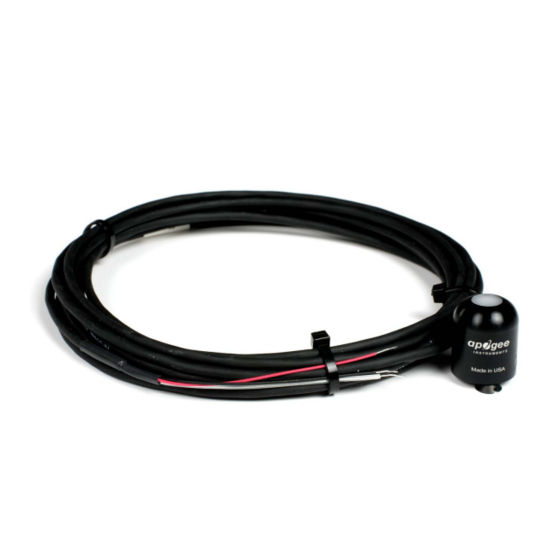Apogee SP-110 소유자 매뉴얼 - 페이지 14
{카테고리_이름} Apogee SP-110에 대한 소유자 매뉴얼을 온라인으로 검색하거나 PDF를 다운로드하세요. Apogee SP-110 18 페이지. Pyranometer
Apogee SP-110에 대해서도 마찬가지입니다: 소유자 매뉴얼 (18 페이지), 소유자 매뉴얼 (2 페이지)

Silicon-cell pyranometers can still be used to measure shortwave radiation in conditions other than clear sky or from
radiation sources other than incoming sunlight, but spectral errors occur when measuring radiation with silicon-cell
pyranometers in these conditions. The graphs below show spectral error estimates for Apogee silicon-cell pyranometers at
varying solar zenith angles and varying atmospheric air mass. The diffuser is optimized to minimize directional errors, thus
the cosine response graph in the Specifications section shows the actual directional errors in practice (which includes
contributions from the spectral shift that occurs as solar zenith angle and atmospheric air mass change with time of day and
time of year). The table below provides spectral error estimates for shortwave radiation measurements from shortwave
radiation sources other than clear sky solar radiation.
Spectral response of Apogee SP series
pyranometers compared to solar radiation
spectrum at Earth's surface. Silicon-cell
pyranometers, such as Apogee SP series, are
only sensitive to the wavelength range of
approximately 350-1100 nm, and are not
equally sensitive to all wavelengths within
this range. As a result, when the spectral
content of solar radiation is significantly
different than the spectrum that silicon-cell
pyranometers were calibrated to, spectral
errors result.
Spectral error for Apogee SP series
pyranometers as a function of solar zenith
angle, assuming calibration at a zenith
angle of 45°.
14
